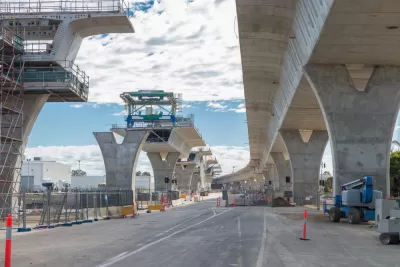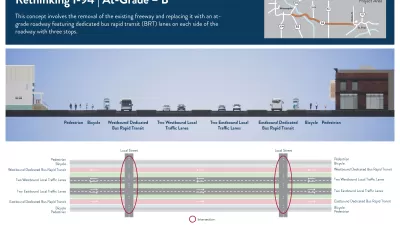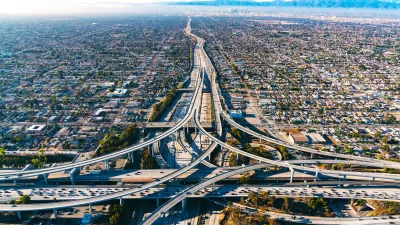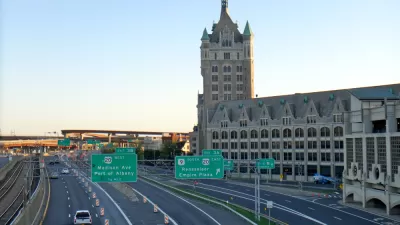The federal Reconnecting Communities program is aimed at supporting highway removal and reversing the damage caused by rampant freeway construction, but some watered down proposals from state agencies could fund road expansion instead.

Competing proposals from lawmakers and state departments of transportation raise questions about how the Biden administration will approach evaluating applications for the Reconnecting Communities Act, which promises $1 billion in federal funding for freeway removal projects.
Writing in Route Fifty, Daniel C. Vock outlines two high-profile examples of cities where activists have been pushing for highway removals, including the infamous Claiborne Expressway in New Orleans. “The story of the Claiborne Expressway is so poignant that the Biden administration referenced it when the president unveiled the idea for Reconnecting Communities,” Vock writes. Yet some transportation officials are backing off removal proposals, expressing concern about the cost of removing freeways, which, in some cases, would surpass the federal funding available. As Vock explains, “The Reconnecting Communities program was cut from $20 billion in Biden’s original proposal to $1 billion in the five-year infrastructure law.”
In some cases, state DOTs want to make aesthetic improvements to existing highways or mitigate the damage of further road expansion with freeway caps and other amenities rather than commit to full highway removal. The Louisiana Department of Transportation has submitted an application for “a $95 million plan that includes the removal of up to four ramps, neighborhood enhancements and expressway improvements,” citing concerns about not only cost, but also the impact of removing the viaduct on local freight and the geo-technical considerations involved in tunneling in the Louisiana soil.
FULL STORY: With $1B at Stake, Clashes Emerge Over Highway Removal

Planetizen Federal Action Tracker
A weekly monitor of how Trump’s orders and actions are impacting planners and planning in America.

Maui's Vacation Rental Debate Turns Ugly
Verbal attacks, misinformation campaigns and fistfights plague a high-stakes debate to convert thousands of vacation rentals into long-term housing.

Restaurant Patios Were a Pandemic Win — Why Were They so Hard to Keep?
Social distancing requirements and changes in travel patterns prompted cities to pilot new uses for street and sidewalk space. Then it got complicated.

In California Battle of Housing vs. Environment, Housing Just Won
A new state law significantly limits the power of CEQA, an environmental review law that served as a powerful tool for blocking new development.

Boulder Eliminates Parking Minimums Citywide
Officials estimate the cost of building a single underground parking space at up to $100,000.

Orange County, Florida Adopts Largest US “Sprawl Repair” Code
The ‘Orange Code’ seeks to rectify decades of sprawl-inducing, car-oriented development.
Urban Design for Planners 1: Software Tools
This six-course series explores essential urban design concepts using open source software and equips planners with the tools they need to participate fully in the urban design process.
Planning for Universal Design
Learn the tools for implementing Universal Design in planning regulations.
Heyer Gruel & Associates PA
JM Goldson LLC
Custer County Colorado
City of Camden Redevelopment Agency
City of Astoria
Transportation Research & Education Center (TREC) at Portland State University
Jefferson Parish Government
Camden Redevelopment Agency
City of Claremont





























